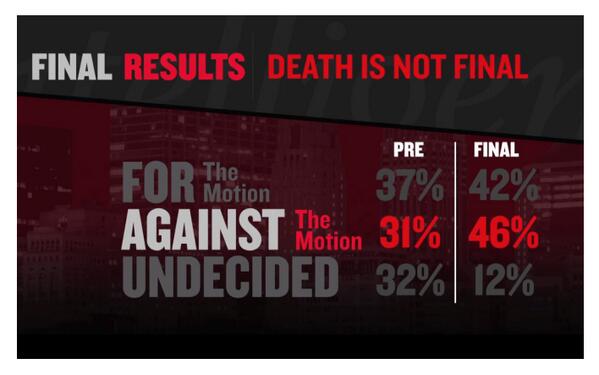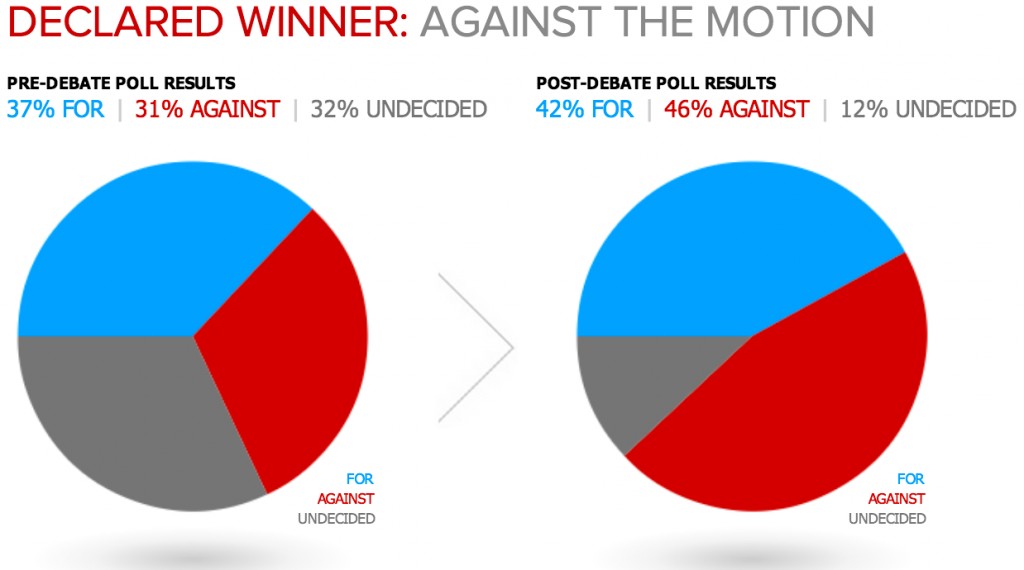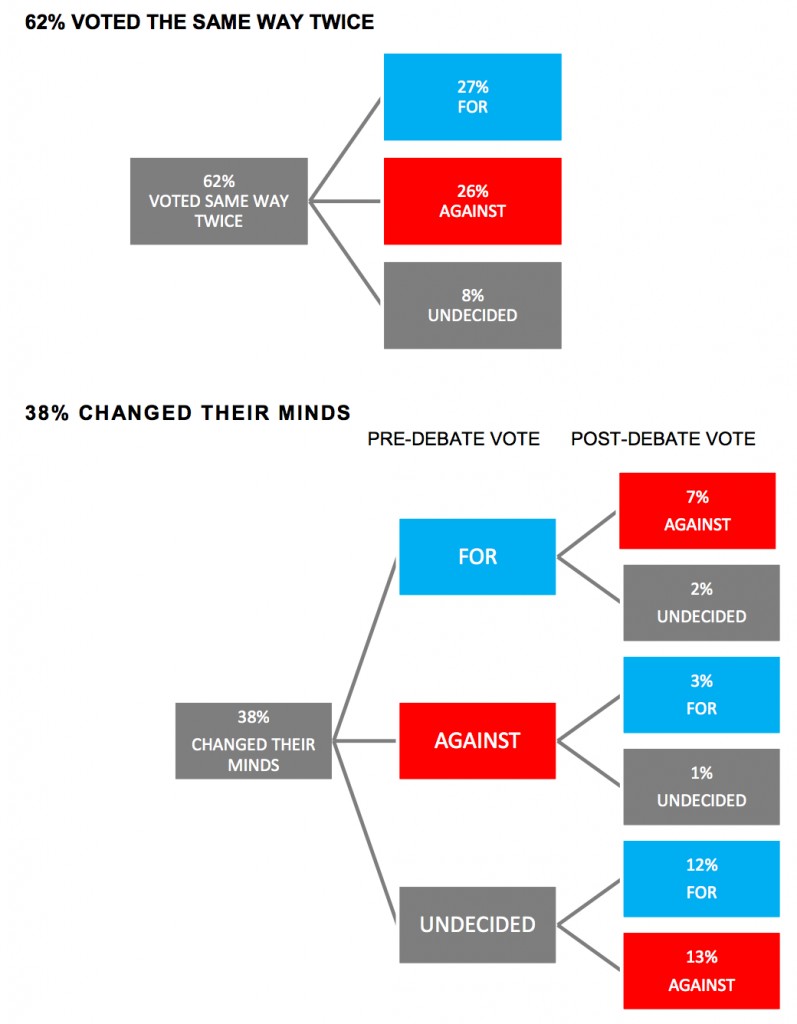Video from Wednesday’s debate over “Death Is Not Final” is now up.
You’ll be happy to hear that the good guys “won.” In scare quotes because helping the world’s population understand that naturalism is the right way to view the universe is a long-term project that won’t be settled with a single debate. But Intelligence Squared does a fun thing where they ask people to vote before the debate starts, and then again afterward. We started out the night slightly behind in the polls, and by the time we were done we were slightly ahead. Mostly by peeling away the undecideds, as any savvy politician strives to do. [Update: oops, not right. See below.] So that counts as a victory — especially when the topic is one where many people (not all!) have fairly fixed opinions.
It was a pleasure to have Steve Novella as a partner. The man knows his neuroscience, as well as his debating. He did a great job making the single most important point for an issue like this: the mind is the brain, full stop. It’s hard to hear the case he makes and hold on to any contrary view.
I was slightly disappointed in the folks on the other side. Eben Alexander basically relied on two things. One was his personal story of having a Near-Death Experience while in a coma. Anyone who accepts that people can experience dreams or hallucinations will not be overly persuaded by that alone. The other was to throw up ideas like “quantum mechanics” and “the hard problem of consciousness” in an obfuscatory way, to give people license to believe that science doesn’t understand everything. Which is true! Science doesn’t understand everything. Which doesn’t change the fact that no serious researcher in quantum mechanics or the hard problem thinks that those ideas provide an excuse for believing in life after death.
Ray Moody was a very pleasant gentleman, someone you’d be happy to have a beer with and talk philosophy. But he did almost nothing to defend the proposition. I was expecting him to broaden the evidence from Alexander’s own case to many others, but instead he spoke in generalities about science and philosophy and logic, concluding essentially that it’s “conceivable” that a realm exists where souls can persist after death. Indeed it is. Many things are conceivable.
At the end of my opening talk I said that the choice here basically comes down to two options we can believe:
- Everything we think we understand about the behavior of matter and energy is wrong, in a way that has somehow escaped notice in every experiment ever done in the history of science. Instead, there are unknown mechanisms allow information in the brain to survive in the form of a blob of spirit energy, which can then go start talking to other blobs of spirit energy, but only after death, except sometimes even before death.
- Physics is right. And people under stress sometimes have experiences that seem real but aren’t.
In the light of the evidence, the choice is pretty clear. We’ll get there, a couple of percentage points at a time.
Update: I was too hasty in presuming that most of our increase came from swaying undecided voters. Here are the actual data:
As you can see, the undecideds actually broke almost equally for the two sides. Our glorious victory actually came from a combination of factors, including persuading some of the “For” voters to switch.



I tried to watch, but I simply could not subject myself to Eben and Moody…at all. To my a priori made-up mind, Shawn Carroll’s opening definition of his status as a Naturalist (i.e., there is =one= world, the natural world) leaves the idea of an afterlife without any sort of foundation. There are so many non-function suppositions about the nature and behavior of an “afterlife world”; so many, that, just as with Santa Claus, there are a lot of descriptions and attributes, but nothing among those features that would propel Santa Claus (or, the “afterlife”) beyond the realm of fiction and myth.
Thank you!!, Sean Carroll, for engaging in these debates. You are exquisitely eloquent, and a joy to listen and see (debating, but much more, lecturing).
Sili – I look at the numbers as saying: 68% came minds made up, 32% claimed to be open-minded, of which a third, 1 in 10 overall – much as in the general population – are, for whatever reasons, never going to commit; and of the 20% who claimed to be open-minded, 2 in 3 decided against … at that moment.
between this and his brilliant performance against craig, sean has emerged as the most effective atheist takedown artist in the debate format. i hope he finds the time to do more of this. he’s performing a great public service.
The mind is the brain.
Once I was convinced of this, I became perfectly comfortable using transporter systems, which, as I understand it, destroy me (including my brain) while reconstructing a perfect copy somewhere else. As they say, atoms have no hair.
Somewhere else or somewhen else. You would think that Eternity is a long time, but it goes by fast when you don’t exist.
Then there was that time that the transporter lost its “lock” on me (whatever that means). But, fortunately, there was an identical copy of me 10^10^29 meters away under the care of a transporter tech that was just slightly (one plank unit) more talented.
They say there is no afterlife. But in reality, there is no after.
It’s staggering still 42% were ‘for it’. I think that is an alarming lost, I’d say.
Moreover, it seems to me those with a scientific tendency always vote undecided prior to the debate, to change his/her mind afterwards. On the other hand, the ‘uninformed’ will most likely stick to his/her guns. The moment they figure this strategy out, they’ll get ‘square’ 🙂
Sad to see that my comment which respectfully disagreed with you was removed. Seems petty and intolerant.
i didn’t realize that alexander had such a murky and unethical professional past.
http://www.dailymail.co.uk/news/article-2529048/Proof-Heaven-doctor-faced-3million-malpractice-lawsuit-fell-coma.html
http://www.esquire.com/features/the-prophet
1. Everything we think we understand about the behavior of matter and energy is wrong, in a way that has somehow escaped notice in every experiment ever done in the history of science. Instead, there are unknown mechanisms allow information in the brain to survive in the form of a blob of spirit energy, which can then go start talking to other blobs of spirit energy, but only after death, except sometimes even before death.
Yeah that was a non-sequitur to what you previously had argued. The fact that conciousness may involve unknown mechanisms doesn’t imply that everything we currently understand about science is wrong.
You were lucky the other side were so poor as to not pick you up on trivial points like this.
Although Physicists have learned much about the world they still have very much, to learn. Even Sean must agree with this. They most likely have barely scratched the surface. Maybe they should devise experiments that would make the existence of a God most unlikely.
I find 3 dislike and 0 like on my earlier Comment
There is 1 full agreement. Obviously by a Fellow-Indian. My thanks to him.
Could the dislike be just knee-jerk reaction?
Sean himself says, a profound quotable quotes, “Life is not a substance like water; it’s a process like a flame.”
Excellent.
Any ‘process’ is a function of time. And ‘time’, as well-thinking Physicists tell us, is an illusion (e.g. See: https://www.youtube.com/watch?v=WKsNraFxPwk ).
So “life” has to be an illusion!
Then what is the “substance” that is Real?
I hope the quick-to-react Physicists will ponder. If you need a hint, watch Prof. Menas Kafatos or Prof. Donald Hoffman at SAND 2013.
A job well done as always, Sean. I truly enjoyed the debate and the great performance you showed. Thanks.
David Lau
Dear Sean
You are multi-talented & so calm & . . . great job in just 7 minutes!
Dr Novella, what a insightful means of showing the mind comes from the wet stuff.
A PDF of the transcript of the debate is also up should anyone prefer to read:
http://intelligencesquaredus.org/images/debates/past/transcripts/050714%20Death%20Not%20Final.pdf
Pingback: The “Death is not Final” debate is up on YouTube now #AfterDeath
I’l be the first to admit that through the process of learning, looking at claims from an opposite perspective can be fruitful.
I’m unable, however, to accept an implicit claim hidden within Eben Alexander’s case for an afterlife namely that brain damage is a kind of optimal mechanism for fact finding.
Call me intolerant.
Mike
Phenomena like NDE or afterlife have to be based on some extra sensory perception. By definition, they belong to a world which is beyond our sensory perceptions. If you demand a scientific proof, such claims would usually lose because science is a study of what we can find out by sensory perceptions. So the outcome of the debate is not surprising. As long as science does not understand consciousness, the scientific claims would always be questionable. We have to find a connection between the two worlds e.g. perhaps by Yoga (?). As many have pointed out, modern physics is already hinting (not proving for sure) that there could be such a world.
I am a professor of physics at a university in New York. I attended graduate school and received a Ph.D. in Physics. I have worked as an educator and a researcher for many years now and I can tell you there was nothing in all my years of study that would make me competent to speak on whether there is life after death. I am heartily sick of physicists running around and pontificating on things they are not qualified to speak about and no studying “on the side” makes you qualified. You seem to believe that your experience as a physicist makes you qualified to offer an opinion as an expert on any subject (e.g. politics!). This is hubris and arrogance pure and simple.
I have thrown in my tuppence on the debate:
http://www.skepticink.com/tippling/2014/05/09/carroll-novella-vs-alexander-moody-some-terrible-terrible-arguments/
concerning Alexander’s one particularly bad argument…
Excellent! You´ll find, tho´, that the contributors only want to hear one point of view – theirs. Further, their point of view is not burdened by much in the way of scientific knowledge. Things like why and how the Universe came into existence will be discovered by next Tuesday and, of course, action at a distance and a few other odds and ends that no-one presently understands should be tied up by breakfast time tomorrow. Some of these Richard Dawkins acolytes will insist that science is irrelevant. Interestingly, Richard Dawkins himself was asked in a Daily Telegraph interview a few years ago:
“Do you absolutely reject the idea of the Universe having been created then?”
He answered: “Absolutely not! Though one would have to explain where the creator came from.”
So – this is just like the Richard Dawkins website from which I got chucked! It´s a bit like the state of North Korea – the only reasonable opinion on any subject is our dear leader´s.
The basic argument is, of course, about whether the Universe might have been consciously brought into existence by something outside of itself – “created”.
Absurd idea! The trouble is that the alternatives are at least equally ridiculous:
1. Universe popped into existence from the absolute nothing – no matter, no energy, no space, no time. Also, it performed this feat for no reason. I wonder how on earth it managed that? There weren´t even any laws of physics. Why did it “decide” to do this about 13.7 billion years ago?
2.Universe has existed, in some form or other, eternally. There are, at the very least, considerable problems with this idea too, problems which seem to make it impossible.
A big problem, for me, is that I don´t see how there can be any current events – why didn´t they already happen, an infinite time ago?
@Charles Lee : It is surprising that you interpreted my comment to imply that I claim to be qualified (as a physicist) to pass judgment on such issues. It was exactly to the contrary. All I meant was that as long as science does not understand consciousness, all such scientific arguments are questionable. As a physicist, you would not want to prohibit questioning. Would you? There are unending 90 years long debates on interpretation of quantum mechanics! As a physics professor or may be as any person you are of course entitled to your opinion. In a short comment, I cannot explain my views. I have discussed these issues on a rival physics blog recently.I cannot give the link. But the title of my guest blog is Hinduism-for-physicists If you care to read it and then criticize, you are most welcome.
@Charles Lee: Since your comment followed mine, I thought it was addressed to me. On second reading, I think, it could have been addressed to Sean. In that case, I would let Sean take care of the issue. I still stand by my statements in the comment though.
I note that my last comment, regarding what seem to be the only three possible explanations for the existence of the Universe, will shortly be disappearing. What a pity! I really thought that someone would be saying: “Don´t be so stupid! There´s a simple and obvious explanation for the existence of the Universe. This is it…………….!”
I suppose they mostly believe that 13.8 billion years ago (say) there was nothing – NOTHING, NOTHING – no matter, no energy, no space, no time, no laws of physics. Then, suddenly and for no reason, there was something!! A nascent universe!!! Essentially complete, really – with all the laws that would account for its future in place. Obvious, really. Happens all the time. I met someone who told me that when he was in the shower, an elephant suddenly materialised in there with him. “So?” I asked, puzzled. “What´s strange about that?” “Nothing, nothing at all – but I´ve discovered that if I prod him in a certain place, a particle in Andromeda suddenly jerks too.”
I´m myself an atheist, but not a militant one. I´ve not, so far, met a militant atheist with a plausible alternative explanation for the Universe and some of the bizarre ways it works. I´ve always found Paley´s watch argument quite compelling – and I see that it´s been making a bit of a comeback in the last few years. The arguments against it always sound a bit contrived.
@Robert :
I have full sympathy for you and your view point, although I am not an atheist. In fact this power of voting out a comment, with which one does not agree, goes completely against the spirit of science. In a scientific discussion, all views, whether you agree with or not, should be permitted. In published papers, at least, you know about the qualifications of the critics. Here you have no idea of who is voting against you! Also there are lots of people who use pseudo names for whatever personal reasons. I visit many other physics blogs and on one of them even had a guest blog published. This is the only blog with this outrageous system.
Sean –
A while back, after one of your video performances was posted here, a couple of commenters (ones who seemed knowledgeable on the subject) offered suggestions on how to make your best appearance on screen (voice, clothing, colors, etc.). You seem to have taken that advice to heart and to have applied it with the same smarts and discernment you bring to every issue in your professional life. What I mean to say is, you look sharp here — indeed, for a guy with the looks of a 14-year-old in perpetuity, you look really sharp.
judging from sean and steve’s expressions in the poster frame of the video, i’d say that’s something of an understatement.